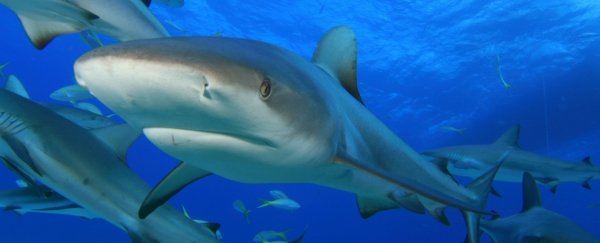Microsoft co-founder Paul Allen has just helped fund a worldwide survey that will monitor vulnerable shark populations living in coral reefs around the world through a giant network of underwater video cameras.
Known as Global FinPrint, the initiative aims to find out important information on how sharks live in the wild, and how they interact with their ecosystems. This data will then be shared through an open-source database, so that researchers and policy makers around the world can use it to protect sharks from extinction.
"Globally, a quarter of shark and ray species are facing an elevated threat of extinction," one of the project's researchers, Colin Simpfendorfer from James Cook University (JCU) in Australia, said in a press release. "This research will help better understand the status of sharks and guide decisions about how to better protect them."
The scientists will use baited remote underwater video systems, or BRUVs, to survey sharks, rays and other marine life living on coral reefs. These BRUVs will be stationed across more than 400 locations in the Indo-Pacific region, tropical western Atlantic, and southern and eastern African and Indian Ocean islands. Over the next three years they'll film the daily routines of marine life.
This footage will be consolidated with hours of existing BRUV footage. You can see some of it below in this video from the Australian Institute for Marine Science, which is also involved in the survey:
"Global FinPrint will help us better understand one of the ocean's great mysteries: What is happening with fragile marine ecosystems when sharks are removed?" said lead researcher Demian Chapman from Stony Brook University in the US. "Are coral reefs healthier or faster to recover from disturbances like coral bleaching or hurricanes because they have sharks? These are hugely important questions."
To work this out, BRUVs will be set up in areas that marine scientists know the least about: the coral reefs surrounding the Indo-Pacific region, tropical western Atlantic, and the islands off the coasts of Africa and India. For the next three years they'll film marine life in the area before the data is consolidated online, using technology from Allen's company Vulcan.
The project, which Allen has set aside US$4 million for, comes after he launched another environmental project, the Great Elephant Census, last year. The census is similar to Global FinPrint, except it looked at elephants and other large herbivores in 13 countries.
I've seen the impact of @ElephantCount, now I'm supporting @GlobalFinPrint to help #SaveSharks http://t.co/lVGNP1lX8e pic.twitter.com/DoVZSAvOvK
— Paul Allen (@PaulGAllen) July 8, 2015
The goal of both is to use technology to collect data and share it with people who can use it to help the planet.
"Better management of sharks and rays starts with better information about where and when they occur, so that we can target mitigation and protect the areas that are critical habitats," said Mark Meekan, a researcher involved in the project from JCU.
The team aims to have the data collected by Global FinPrint uploaded to an open-access database by mid 2018. We can't wait to see more of the footage.
Want to help protect our oceans? Find out more about studying marine biology undergrad or postgrad at JCU.
